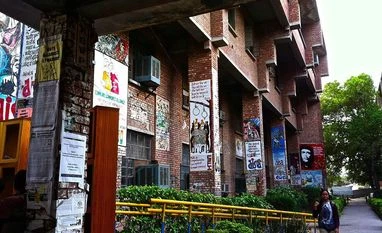What's behind JNU's last-minute cancellation of Israel-Palestine seminar?
A report said that the university cancelled the seminars without offering a detailed reason. Insiders indicate concerns over potential campus protests influenced the decision
Abhijeet Kumar New Delhi The Centre for West Asian Studies at Jawaharlal Nehru University (
JNU) recently called off three seminars set to be delivered by Iran, Lebanon, and Palestinian ambassadors on the current conflict in West Asia, attributing the decision to ‘unavoidable circumstances’, according to a report by The Indian Express.
The seminar was titled ‘How Iran sees the recent developments in West Asia’.
On Thursday (October 24), just hours before Iranian Ambassador Iraj Elahi was set to deliver a talk at 11 am on Iran’s perspective regarding recent events in West Asia, seminar coordinator Sima Baidya informed students via email that the event had been cancelled.
In the same email, Baidya notified students that a seminar on Palestine’s ongoing violence, scheduled for November 7 and intended to feature Palestinian Ambassador Adnan Abu Al-Haija, as well as a November 14 seminar on Lebanon’s situation, expected to include Lebanese Ambassador Rabie Narsh, had both been cancelled.
Why did JNU cancel the seminar?
The report, citing unnamed sources, stated that the university cancelled the seminars without providing a detailed reason, but university insiders suggested concerns over potential campus protests influenced the decision.
Members of the School of International Studies (SIS), under which the Centre operates, reportedly expressed apprehension over how the campus community might respond to discussions on such sensitive topics.
A source reportedly explained that the seminars were intended to offer insights into West Asian countries’ perspectives amid ongoing geopolitical tensions but noted concerns about possible campus reactions.
In an internal message, SIS Dean Amitabh Mattoo advised faculty to consult with him before inviting diplomats to public events, highlighting the importance of maintaining academic freedom while ensuring sensitive topics were managed responsibly.
Sameena Hameed, chairperson of the Centre for West Asian Studies, later clarified that the seminar with the Iranian Ambassador was postponed due to last-minute arrangements that did not allow sufficient time to follow necessary protocols, The Indian Express said.
She said the other two events had not yet been officially scheduled by the Centre. Hameed reassured that ambassadors have regularly engaged with the university and will continue to do so.
India’s official position on Palestine
India, ironically, has long upheld a two-state solution, countering Israel’s claim to all of Palestine.
India supports the establishment of an independent, sovereign state of Palestine existing peacefully alongside Israel, within secure and recognized borders. This stance has been consistently echoed by Indian representatives at international forums, such as the United Nations, where India has condemned civilian casualties and called for humanitarian aid in conflict zones, including Gaza.
In April this year, Ruchira Kamboj, India’s permanent representative to the UN, emphasised the need for peaceful negotiations among all parties involved in the West Asian conflict, reaffirming India’s commitment to a two-state solution that respects both Palestinian sovereignty and Israeli security concerns.
“We are committed to supporting a two-state solution where the Palestinian people are able to live freely in an independent country within secure borders with due regard to the security needs of Israel,” she had said.

)